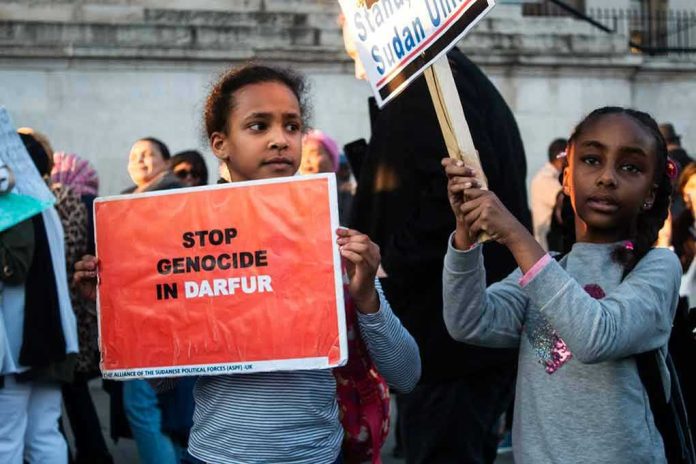
El Fasher, once a haven for hope in Darfur, has become a sealed chamber of horrors—where over a quarter million civilians now wait, powerless, for deliverance that may never come.
Story Snapshot
- The Rapid Support Forces (RSF) have seized El Fasher after a 500-day siege, trapping more than 260,000 civilians without basic necessities.
- Mass executions, rape, starvation, and disease outbreaks are reportedly rampant, with international aid blocked and few able to flee.
- Humanitarian groups warn of a collapse echoing the darkest days of the early 2000s Darfur genocide, as the world watches in near silence.
- The fall of El Fasher signals a shift in Sudan’s conflict, threatening to destabilize the entire region and shatter trust in international protection.
El Fasher’s Fall: A Catastrophe in Real Time
El Fasher’s descent was not a sudden collapse but a slow, grinding siege that tested every limit of human endurance. For 500 days, RSF forces tightened their grip, choking off food, water, and hope. By October 2025, the city—once a humanitarian lifeline for Darfur—had become a trap. The RSF’s final assault scattered defenders and left civilians at the mercy of armed men with a history of brutality. For those inside, daily life now means dodging bullets, scavenging for scraps, and hiding from marauders who see no difference between combatant and child.
Escape is a matter of luck and risk. Only a few thousand have made it to Tawila, often on foot, through gauntlets of violence and extortion. The majority remain, crammed into ruined neighborhoods or makeshift camps, each day growing weaker. As the world debates the finer points of diplomacy, El Fasher’s people face choices as stark as starvation or slaughter.
Echoes of Darfur: Atrocity and Apathy Intertwined
The suffering in El Fasher is not an isolated tragedy but a grim echo of Darfur’s bloodiest years. The RSF, forged from the notorious Janjaweed, now wields unchecked power in the city. Reports from the World Health Organization, United Nations, and International Rescue Committee paint a picture so dire it strains credibility: summary executions, mass graves, systematic sexual violence, and deliberate starvation. For aid workers and diplomats who remember the promises made after Darfur’s first genocide, this is more than a crisis—it is a betrayal, both of the innocent and of the world’s supposed red lines.
International organizations have publicly condemned the violence, but their access is blocked, their appeals ignored. UN officials warn that El Fasher’s fall marks a “significant shift” in the war, exposing the weakness of international resolve. The risk of another ethnic cleansing looms over the city, sharpened by each new report of atrocity, each silent response from the world beyond Sudan’s borders.
The Human Toll: Disease, Desperation, and Displacement
Humanitarian collapse is not an abstraction for El Fasher’s residents; it is a daily calculus of survival. Water sources have dried up or been poisoned by conflict. Food deliveries have ceased, forcing families to survive on wild roots and contaminated grain. Hospitals, once beacons for the sick and wounded, now serve as graveyards—when they function at all. The World Health Organization urgently warns of cholera outbreaks and rampant malnutrition, with children bearing the brunt. Aid agencies, cut off by shellfire and checkpoints, can offer only warnings as the crisis spirals beyond control.
Displacement on this scale reshapes not only El Fasher but the region itself. Those who escape join tens of thousands on the road to Tawila or the long, perilous route toward Chad and South Sudan. Host communities already stretched beyond capacity now face a flood of desperate arrivals. With every new wave of refugees, the risk of regional destabilization climbs—a threat not only humanitarian but political, as borders strain and old grievances resurface.
World Watches, Promises Fade: The Legacy of Failure
In the halls of the United Nations, in the press releases of the World Health Organization, the message is unambiguous: El Fasher is a test of the world’s conscience, and so far, that test is being failed. UN experts describe a “failure of protection,” a phrase that barely contains the despair of those watching another city slip into the abyss. The International Rescue Committee’s blunt assessment—El Fasher as “hellscape”—resonates with those who remember Darfur’s darkest days. The city’s fall is not just a military defeat for the Sudanese Armed Forces; it is a collapse of faith in the very institutions meant to prevent such horrors.
Debate rages over what, if anything, can still be done. Some urge immediate intervention, others plead for negotiations. But as the world deliberates, time runs out for those still trapped. The lessons of Darfur are being rewritten in El Fasher—this time, with fewer witnesses, and even fewer willing to act.
Sources:
World Health Organization (WHO)
International Rescue Committee (IRC)
United Nations (UN) Human Rights













